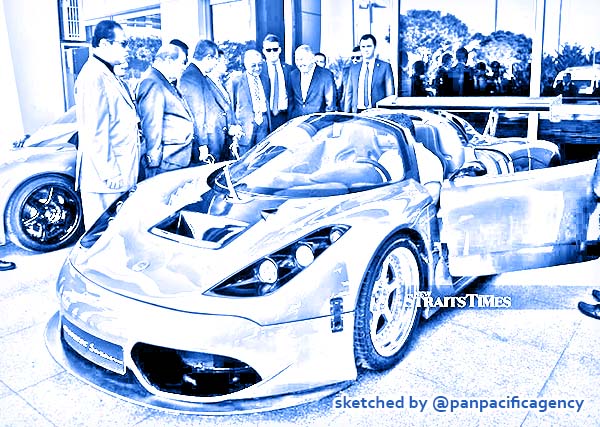Malaysia open to collaboration with foreign firms for national cars: PM

Tun Dr Mahathir Mohamad has pictured the possibility of Malaysia producing "super cars" in order to further enhance the capability of the nation’s automotive industry. (BERNAMA). Sketched by the Pan Pacific Agency.
KUALA LUMPUR, Feb 21, 2020, Malay Mail. Malaysia is open to collaborate with foreign companies to develop new national cars under the National Automotive Policy 2020 (NAP 2020), Prime Minister Tun Dr Mahathir Mohamad said today, Malay Mail reported.
He said that Malaysia has experience developing both Proton and Perodua with Japan previously, and would be ready to collaborate with companies from all over the world that have the right technology for the Malaysian automotive industry.
“Now advances not only made in Japan but other countries as well including China, Korea and European countries.
“We will collaborate with countries that have unique technology,” he told reporters after launching NAP 2020 here.
Malaysia is set to collaborate with China for the development of South East Asia’s first next-generation vehicle (NxGV) hub in Cyberjaya.
A Memorandum of Understanding were inked last month between inked between Malaysian Automotive, Robotics and IoT Institute (MARii) and State-owned China Automotive Technology and Research Centre Co Ltd (CATARC) on knowledge transfer, standardisation of technical standards and the construction of facilities within the test centre for the establishment of the full-fledged NxGV test centre in Malaysia which will support the industry of hybrid and electric cars.
The next-generation vehicle industry is also the focus of NAP2020 which was launched earlier this morning.
In addition, Dr Mahathir also said that the government will provide trainings for Bumiputera automotive vendors as there are not enough of them in the front-end of the automotive industry such as in marketing and promotion.
He said the government will fund a way to provide training under the economic equity.
“We found Bumiputera involved mainly on production side but on marketing side where they lag far behind and there is a need to correct this imbalance.
“Obviously, we realised certain weakness in terms of marketing.
“We need to provide training and exposed to experience where they can learn all about marketing, promoting products and etcetera and of course this need money,” he said.